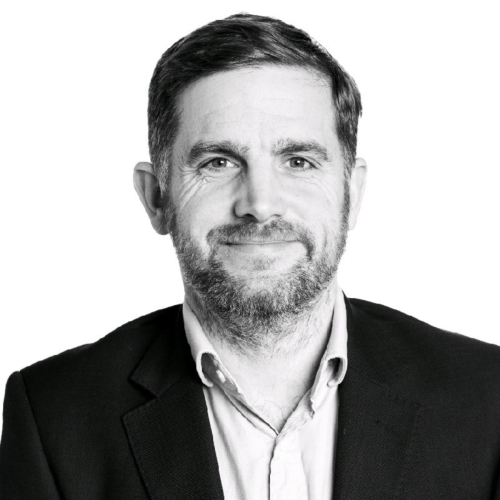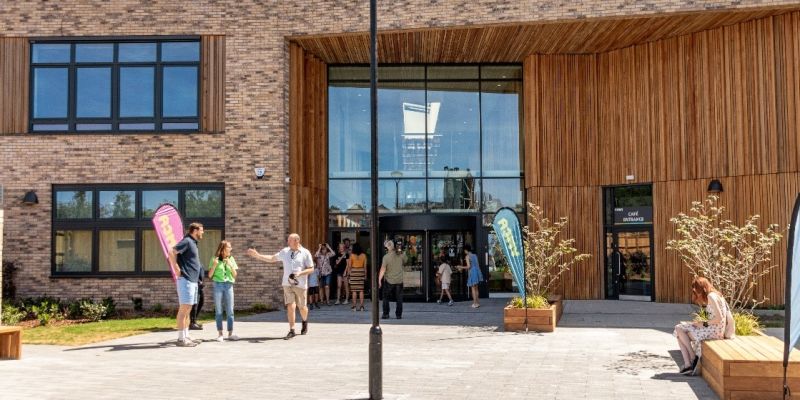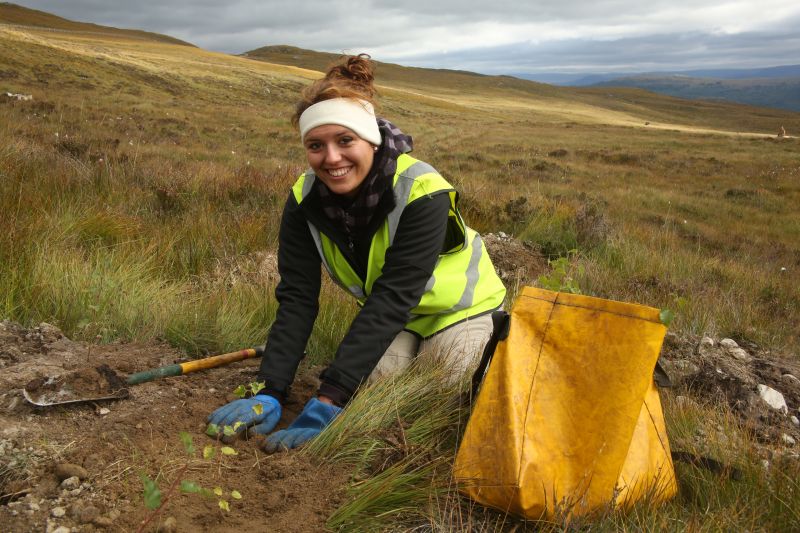Introducing the next of our 'Meet the Investor' mini-series! This week, we hear from the brilliant Jeremy Pannell, Senior Corporate Finance Manager in the advisory and investment crowdfunding team at Triodos, as he explores the importance of people, the value of research and the diversity of his Spotify algorithm!
All about you
What is your name?
Jeremy Pannell
What is your job title?
Senior Corporate Finance Manager
How long have you worked at Triodos?
12 years
Where are you from / where are you based now?
I’m an Aylesbury duck; I was born in Buckinghamshire before moving to Papua New Guinea (PNG) at 6 weeks old. I lived in PNG and Australia until I was four. Since then, I have been entirely UK-based and have spent the last 19 years working and living in or around Bristol and the Mendips hills.

Spotlight on: Triodos
What does a typical day look like at Triodos?
So the first thing to say is that I work in the advisory and investment crowdfunding team, not on the lending side…
The joy for me is there is no typical day! The focus of my team is working with impact-led organisations to raise growth capital via our investment crowdfunding platform or to help them access funding from the ecosystem of institutional social investors. Over the course of a year I could be working with a national charity supporting those with learning difficulties, working on raising funding for a large rewilding project, raising capital to support a social enterprise support ex-offenders back into employment or sourcing investment for the construction of a wind farm. Quite a mix!
A typical day tends to involve a bit of everything – writing an investment offer document or investor pitch deck, preparing financial forecasts, considering the right form of investment (debt or equity) for a client and what sort of terms are most appropriate, preparing robust responses to investor due diligence questions, negotiating investment terms with investors and lawyers, doing some business development, researching a new sector opportunity, attending or speaking at an event, visiting a client and meeting with the individuals they may be supporting. The list goes on!
What’s the best thing about working at Triodos?
Triodos is a global pioneer in sustainable banking, using the power of finance to support projects that benefit people and the planet. Our core belief is that banking can be a powerful force for good: serving individuals and communities as well as building a more sustainable society. I like to think we really deliver on our mission and support like-minded organisations deliver catalytic change. It feels great to start each day knowing that you work for an organisation whose values align with your own.
On a day-to-day level, the most rewarding aspect of my role is the variety of projects we support and the opportunity to support organisations that are delivering transformative societal and planetary impact. It is the charities and social enterprises we work with that create real change, working on the ‘front line’ often with highly vulnerable people but it is nice nonetheless to play a small role in the process by sourcing the funding they need to deliver that impact.
What’s most important to Triodos when looking at organisations to invest in?
Clear and tangible impact is front and centre in our thinking; if an organisation doesn’t have a positive impact in line with our minimum standards, then we can’t progress.
Thereafter, robust financial track record, a clear ability to service any investment, a robust strategy, resilience to withstand external trading pressures and likely appeal to our crowdfunding audience are all critical factors.
If I had to pick out one, I’d say ‘people’. The strength of leadership is key. Behind every great organisation are the people!
What does your organisation offer in terms of social investment – are there any specific products or social issues that you prioritise?
Triodos have two main offers to organisations looking for capital.
Most of Triodos’ activity is secured lending from our Business Lending team; they offer loans ranging from £100,000 - £20m, nearly always with a charge over the borrower’s property.
Alongside that, our corporate finance team provide advisory services and also operate our investment crowdfunding platform. My team’s focus is on supporting organisation that may not be suitable for bank debt (perhaps because they don’t have property to offer as security) to raise other forms of social investment (typically £500k-£5m). We will work with an organisation to build an investment proposition that we can take out to the social investment ecosystem.
On our investment crowdfunding platform we tend to raise unsecured debt (usually repayable over 5-10 years) - we call these bonds - and, less frequently, equity.
Our core impact themes are wellbeing (health, education, nurseries, arts and culture, philosophy of life and recreation); the energy transition (renewable energy and electrification of transport); nature, food and the circular economy; and society (housing associations, community land trusts and charities)
What’s been the most challenging for Triodos in the last few years?
Adapting to the is changing macro environment. It’s been a testing time for many of our borrowers and investees, particularly those who have exposure to consumer spending – tricky when those individuals are having to tighten the purse strigs or make fewer charitable donations etc. We have low default rates for capital raised via our investment crowdfunding but no charity or social enterprise is immune to challenging trading conditions.
Inevitably, the change in bank of England base rates have seen borrowing costs rise and many charities have opted against borrowing in the current climate for understandable reasons; this of course, impacts the pipeline of projects looking for our support, although across our advisory services we have remained very busy, notably on the nature based solutions side of things.
What’s next for Triodos – any priorities for the next 5 years that you’re able to share?
We are currently doing lots in the nature based solutions sector, helping wildlife trusts and charities to develop strategies around rewilding, flood management, enhancing biodiversity, landscape recovery and preserving ecosystem. It’s certainly an important sector for both our advisory and lending offering.
Exploring social investment...
What’s one myth about social investment you’d like to bust?
Social investment is not:
- A source of income. Yes, it’s a source of cash but it is not designed to replace lost revenue sources (e.g. lost Local Authority contracts, falling donations etc). It is a form of borrowing and so has repayment obligations attached;
- Is not ‘soft’ borrowing; it is important that investors, particularly members of the public looking to invest into social investment offers, have confidence in the sector and see investment opportunities as high quality, credible, high impact and offering market-conforming returns – not as sub-commercial or akin to philanthropy and not where ‘social’ always means high risk;
- Social investment can - within reason - be tailored to the needs of the project or organisation and shouldn’t be an ‘off the shelf’ offer that may not fit the cash flows of a charity.
Do you have any memorable investments you’d like to spotlight?
Two spring to mind:
My colleague Tom did a great job leading on our charity bond issue for YMCA Robin Hood Group. The charity provides a range of frontline services across Greater Nottingham, York and East Riding, plus Newark & Sherwood, to encourage young people to belong, contribute and thrive. This includes residential settled care homes, supported housing and numerous support programmes.
We supported the charity with the development of a £16.5 million Community and Activity Village in Newark-on-Trent in close partnership with the Local Authority. This new development was a core element in the regeneration of Newark and – now it’s open! - provides a range of accessible educational, health, leisure and community services to the town and its surrounding area.
Our Corporate Finance raised £3m via a charity bond offered on our Investment Crowdfunding platform, whilst our lending colleagues provided a £6.75m term loan facility; a great example of both sides of the bank coming together to deliver the project. The village is now open and really is an inspiring place.

Another project that resonates was the £2m charity bond issued by Trees for Life, a charity working to rewild the Scottish Highlands. The charity wanted to expand their impact and create more revenue to support their conservation work. They developed plans to build a rewilding centre on their Dundreggan estate combining a visitors centre with accommodation. They raised capital from their own reserves and capital grants and needed a further £2m to make the rewilding centre a reality.
We worked with the charity to raise £2m via our crowdfunding platform. The Dundreggan Rewilding Centre in Glenmoriston opened in April 2023 and showcases how large-scale nature recovery can give people inspiring experiences while creating jobs and benefiting rural communities.

Do you have any top tips for organisations currently exploring social investment?
Research the adviser, investor or crowdfunding platform you are approaching before you reach out; tailor your approach according. Like any initiation of a new professional relationship, this demonstrates that you have done the groundwork to understand their requirements. Whilst this may take a little more time initially, it is likely to reap dividends in the longer-term.
How would you describe the ‘Due Diligence’ process at Triodos and why is it important?
I‘ll answer this on behalf of our corporate finance team as the lending team have their own processes and credit approval requirements.
We have a robust due diligence process. This is for two reasons; firstly, we want to be entirely confident that will be able to raise capital and meet the due diligence requirements of institutional social investors. Secondly, for our investment crowdfunding platform, we only want to offer high-quality investment opportunities to members of the public; reputationally, it has the potential to be very damaging if the organisations we have presented on our platform are unable to meet their repayment obligations.
In headline terms, our due diligence process will include:
- A review of the mission and ethos of the organisation and an assessment of the environmental impact being delivered.
- A detailed review of past financial performance including annual accounts and most recent management accounts.
- Ensuring that the organisation has prepared a set of credible financial forecasts. We will often work with the organisation to prepare these.
- Assessing the organisation’s ability to meet their capital and interest payment obligations under the forward-looking assumptions, including in the event of underperformance.
- A review of the management team and the governance structure to assess whether this appears appropriate.
Sometimes is necessary to bring in some third-party advice – maybe to support with a property valuation, to get a technical assessment of the generation potential of a new solar farm that a charity is putting in place or to source some specific tax advise – but, in the main, we do all our due diligence within our team.
What’s the most difficult part of being a social investor?
Saying no to early-stage social enterprises who are working to address our most intractable social problems but not really financially positioned to service social investment (e.g. repay the investment).
If you could change one thing about the social investment sector, what would it be and why?
It would be transformative for the sector if those individuals who are fortunate enough to have the ability to save and invest, were more widely aware of how they can invest in socially-motivated projects and organisations rather than defaulting to more widely accessible and non-impact focused investment and savings products.
Linked to this, if the social investment world was more widely understood and supported by the mainstream wealth and asset management sector, then we might see more individuals working with their financial advisers to investing in genuinely socially motivated products.
Where would you signpost organisations if they’re looking for further support / resources ahead of applying for social investment?
Good Finance. It provides a helpful overview of what social investment is and profiles all the main investors and advisers. A great place to start your journey into the sector.
Before you go, just for fun...
What did you want to be when you were little and why?
A travel writer. I spoke to someone yesterday whose email sign-off/job title was “Travel addict, food lover and conservationist”. Envious!
What’s the last thing you searched for on Spotify?
Almost certainly a sleep meditation!
What are you watching / reading / listening to right now – any recommendations?
Watching: after resisting the initial clamour, I have just finished watching Baby Reindeer; an uncomfortable watch but hopefully important in raising discussion around sexual abuse. On a more light-hearted note – and as a pseudo-Bristolian – I recently felt obliged to dive into series 3 of The Outlaws; nice to see Bristol-profiled in all its glory and interesting to see Jessica Gunning in a slightly different light to Baby Reindeer!
Listening: wow, I think the Spotify algorithms are put to the test in our family. My leaning to indie and soul is juxtaposed with my children’s eclectic requests for Ed Sheeran, Taylor Swift and Kids Bop Kids. You never quite know what Spotify will recommend next. I also love a sport, comedy or crime drama podcast!
Reading: Abroad in Japan – the autobiographical tale of a young British teacher who re-located to Japan aged 22 to teach Japanese students English. It’s a fun insight into the nuances of Japanese culture! My little boy is wowed by the neon-light culture of Tokyo so even he listened in as mummy read it aloud to keep me alert on a 7-hour car journey back to St Malo on a recent holiday!
Anything else you’d like to share with our users before you go?
Do reach out to us if you have any questions! Triodos Bank (triodoscrowdfunding.co.uk)
